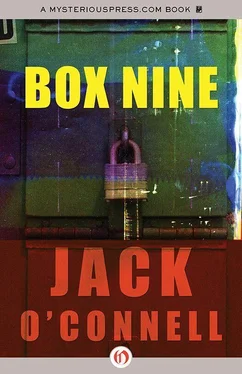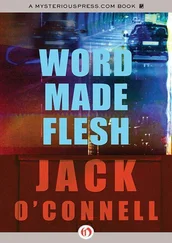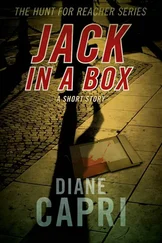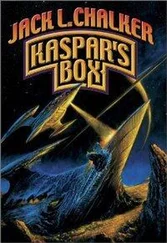• • •
“The irony is,” says Woo, “that I actually have family in Bangkok. The real Bangkok. In Thailand. Distant cousins. Some branch of my mother’s side of the family.”
“Just one crazy world,” says Lenore, keeping her eyes on the back door of the hotel.
“I don’t know Mother’s side very well, actually. Very diverse. Very spread out. Father’s people were from Hong Kong. He was something of an electronics wizard. He emigrated in 1935 with his new bride.”
“Adventurous guy.”
“He did well. Classic story from that generation. Poverty to the good life in thirty years. He ended up the head of Research and Development at Yen Labs.”
“Still alive?”
“He died two years back. My mother’s alive, though. She’s at the McLaughlin Home. Fine place.”
Lenore says nothing, but lets out a long sigh. Her speed kick is fading a little and she knows that within the hour her nerves are going to get a little raw.
“How about your people?” Woo asks. “Your parents?”
Lenore stares straight ahead, tries not to blink. “Both gone.”
“Your father was a mailman.”
“For about forty years. Ma kept the house. They were nuts for each other. One of those deals.”
“I like the way you talk,” Woo says.
“Shut up,” Lenore says.
• • •
The Jaguar rolls into the garage. After a few seconds Mingo and Max emerge. There’s no sign of Cortez. Lenore figures he took the private elevator straight up to his place. She watches as Mingo pulls a wad of bills from his pocket, peels off a couple, and hands them to Max, talking the whole time. She wishes she had brought a high-powered lens and the ability to read lips. She thinks for an instant about asking Woo if he can read lips, but stays quiet.
Mingo steps back into the garage and the door rolls closed in front of him. Max pushes the money into his army-pants pocket and sets off down Goulden Ave, probably, Lenore guesses, to pick up some groceries or household supplies. She waits until he’s out of sight, a good block up the road, then cranks the Barracuda and pulls out of the alley.
They pull to the curb slightly in front of Max and in her side-view mirror she can see him raise his bushy eyebrows. She lowers her window, waits a second for him to approach the door, and says, “Maxie, honey, I’ve missed you like crazy.”
“What a wiseass,” Max mumbles, and climbs in the back.
On the ride up to the penthouse, the elevator speakers play a scratchy rendition of an old tango. Cortez concentrates, tries to recall its name, gives up when he reaches the top and the doors slide open. What he wants, more than anything, is solitude, to be isolated in his library, to leave word with Jimmy Wyatt that no one is to come upstairs under any circumstances. That when he wants food or tea he’ll buzz the kitchen and Max can leave a tray outside the library door.
It’s not that he wants a long stretch of time to read. His capacity for reading is diminishing daily. Not long ago, he was a recordbreaking reader. Often, he consumed a book a day, first page to last in one sitting. It’s been almost a month since he finished a book, a novel, written in an archaic Uruguayan dialect. It had started off like some kind of occultish mystery story, but changed at some point. There were passages he couldn’t completely understand, and he got in the habit of supplying his own action at those junctures. It was the story of an indentured slave and his master, the descendant of European adventurers. They’re the last inhabitants of an ancient family castle in some unnamed mountain region. The master is growing decrepit. He’s the last of his bloodline and with each passing day it seems his cruelty toward his loyal servant grows geometrically. Cortez had the most difficulty with the last chapter in the book. It appeared to be a dream sequence, but there was no way to be sure. So he assigned his own meaning to the strange words on the last five pages, and turned the book into a revenge tale with the abused servant finally gaining the upper hand, avenging the pain of all his slave forebears, and in a bloody orgy of repressed hate set free, severing the old aristocrat’s head and rolling it down the most jagged face of the mountain.
Cortez wishes he were better with languages. He’s not bad, but he yearns for a natural facility, an innate talent that would give him foreign tongues with the ease of a reflex. What he really needs is time to concentrate, hours of uninterrupted study.
He lets himself into the library, unbuttons his double-breasted jacket, pushes a hand halfway into his pants pocket. He starts to walk around the outer edge of the room, next to the walls of empty shelves. He pulls an index finger across the length of the waist-level shelf and draws a line in a deep layer of dust. It’s not the staff’s fault. Everyone, even Max and Mingo and Jimmy Wyatt, has strict orders to stay out of the library. The library is for Cortez alone.
Months ago, the shelves were loaded, crammed with books, mostly fiction, a surprising number of whodunits. Packing all the volumes into those reinforced cartons took days, but Cortez did it by himself, late at night, looking blandly at each novel for just a second before laying it in its box.
He’s not sure why, but he has always held the belief that a successful man must own a library. Where did this gauge of status come from? He can find no trace of it in any books and movies he was exposed to as a kid. It’s doubtful it came from his mother or any of the dozen aunts who moved in and out of their small homes during his youth. It must be something that sprang, independent, into his still-forming brain. Just some weird, random spasm of development.
The buzzing noise begins to sound. When did phones trade in the ring for the buzz? He takes a deep breath, holds it, and watches the phone, a cordless black science-fiction prop, ring from on top of the mantel. Then he starts to walk toward it in slow motion. He makes foolish, time-distorted, exaggerated motions. He pretends he’s an Olympic sprinter, shown on television from a distant country, crossing the finish line in a slowed-down instant replay, all arms and legs pumping.
He lifts the phone off the mantel as he exhales.
“Cortez,” he says, all gasp and wheeze … “Yes, sorry, time got away. I was at the other end, ran the whole way … I’m sorry, could you speak one at a time? The connection … I understand. I thought it might be best to have my driver hand-deliver it … Yes. Yes. I see. Very well, I’ll see to it. I’ll just mention again that we do have the testing facilities here and we could fax— … Yes, of course. Certainly. The matter has had my utmost concern … Well, he tried to say the sample went light on my end … My feeling is that we’re dealing with a first-time middleman, a broker with too much ambition and not enough experience. I would— … Yes, of course, I know. And I have. Very traditional message. He can’t mistake our intentions. The first box is a warning. The next step is his … Well, the problem, as I see it, is we have no alternate sources. This is a prototype. There is no competition. I’ve looked at the most recent reports from all the relevant networks. The Triangle isn’t even aware. General Gow in Burma hasn’t even heard rumors yet. I think it’s safe to say one hundred percent domestic. Hard to believe— … Uh-huh, uh-huh, that’s right. An accidental by-product. All the great products arrive this way … Oh, please, must we? Must you insult me this way each time? That’s a legitimate expense. My car is the purest sign of my stature in the community. And I wouldn’t have those neighborhood monkeys fill the gas tank. They couldn’t tell a Jaguar from a Volkswagen … We agreed on this … All right, fine. Fine. I don’t wish to argue … Yes, I’ll be here … Yes. Yes. Goodbye.”
Читать дальше












